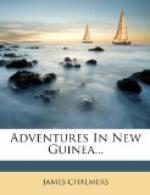Our party was a tolerably large one—Ruatoka (the Port Moresby teacher), some Port Moresby natives, and four Loyalty Island teachers, on their way to East Cape. We did not see a strange native all the way. We had our hammocks made fast in the bush by the river side, and rested until three p.m., when we started for another part of the river about seven miles off, in a south-east direction. Mr. Goldie also shifted his camp. After sunset we reached the point where the river was to be crossed, and there we meant to remain for the night.
We had a bath, then supper, and evening prayers; after which we slung our hammocks to the trees, in which we rested well. It was a strangely weird-looking sight, and the noises were of a strange kind—wallabies leaping past, and strange birds overhead. Mr. Goldie’s Mare men joined with their countrymen, the teachers, in singing some of Sankey’s hymns in English. Soon sleep came, and all seemed quiet.
At three a.m. of the 26th we struck camp, and after morning prayers we began to cross the river, which was not over four feet in the deepest part. It was here Mr. Lawes crossed when he first visited the inland tribes; so now, led by Ruatoka, we were on his track. The moon was often hidden by dark clouds, so we had some difficulty in keeping to the path. We pressed on, as we were anxious to get to a deserted village which Mr. Goldie knew to breakfast. We reached the village about six, and after we had partaken of breakfast we set off for the mountains. When we had gone about four miles the road became more uneven. Wallabies were not to be seen, and soon we were in a valley close by the river, which we followed for a long way, and then began to ascend. We climbed it under a burning sun, Ruatoka calling out, Tepiake, tepiake, tepiake (Friends, friends, friends). Armed natives soon appeared on the ridge, shouting, Misi Lao, Misi Lao. Ruatoka called back, Misi Lao (Mr. Lawes), and all was right—spears were put away and they came to meet us, escorting us to a sort of reception-room, where we all squatted, glad to get in the shade from the sun. We were now about 1100 feet above the sea level. We were surprised to see their houses built on the highest tree-tops they could find on the top of the ridge. One of the teachers remarked, “Queer fellows these; not only do they live on the mountain tops, but they must select the highest trees they can find for their houses.” We were very soon friends; they seemed at ease, some smoking tobacco, others chewing betel-nuts. I changed my shirt, and when those near me saw my white skin they raised a shout that soon brought the others round. Bartering soon began—taro, sugar-cane, sweet yams, and water were got in exchange for tobacco, beads, and cloth.




